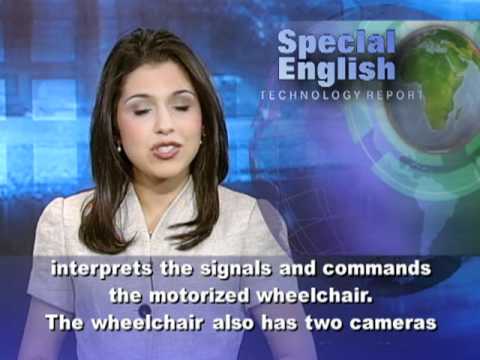Brain-Computer Interfaces Could Mean More Freedom for the Disabled
 |
This is the VOA Special English Technology Report, from voaspecialenglish.com | facebook.com/voalearningenglish
Since the nineteen seventies, scientists have been searching for ways to link the brain with computers. Brain-computer interface, or BCI, technology could help people with disabilities send commands to machines. Recently, scientists demonstrated a small robotic vehicle directed by a person's thoughts. The demonstration took place at the Swiss embassy in Washington. Jose Millan and Michele Tavella developed the system. Mr. Tavella can even talk as he watches the vehicle and guides it with his thoughts.Mr. Tavella is a researcher at the Federal Polytechnic School in Lausanne, Switzerland. In the laboratory, he can operate a wheelchair just by thinking about moving his left or right hand.Professor Millan is the team leader. He says systems like those being developed in Lausanne and other places may be available in less than ten years. The aim is to give people with physical disabilities new ways to communicate and control devices through brain-machine interfaces.Our brain has billions of nerve cells. These send signals through the spinal cord to the muscles to give us the ability to move. But spinal cord injuries or other conditions can prevent these weak electrical signals from reaching the muscles.The researchers designed a special cap for the user. It captures the signals from the scalp and redirect them to a computer. The computer interprets the signals and commands the motorized wheelchair. The wheelchair also has two cameras that identify objects in its path. They help the computer react to commands from the brain.Professor Millan says scientists keep improving the computer software that identifies brain signals and turns them into simple commands. He says: "The practical possibilities that brain-machine interfaces offer to disabled people can be grouped in two categories: Communication, and controlling physical devices and virtual devices." One example is the wheelchair. He says his team has set two goals. "First is testing with real patients, so as to demonstrate that this is a feasible technology they can benefit from. And the second aspect of that is to guarantee that they can use the technology over long periods of time."For VOA Special English, I'm Alex Villareal. You can learn more about the world everyday and learn English at the same time at voaspecialenglish.com. You can also connect with us on Facebook and Twitter at VOA Learning English.
(Adapted from a radio program broadcast 04April2011)
|




